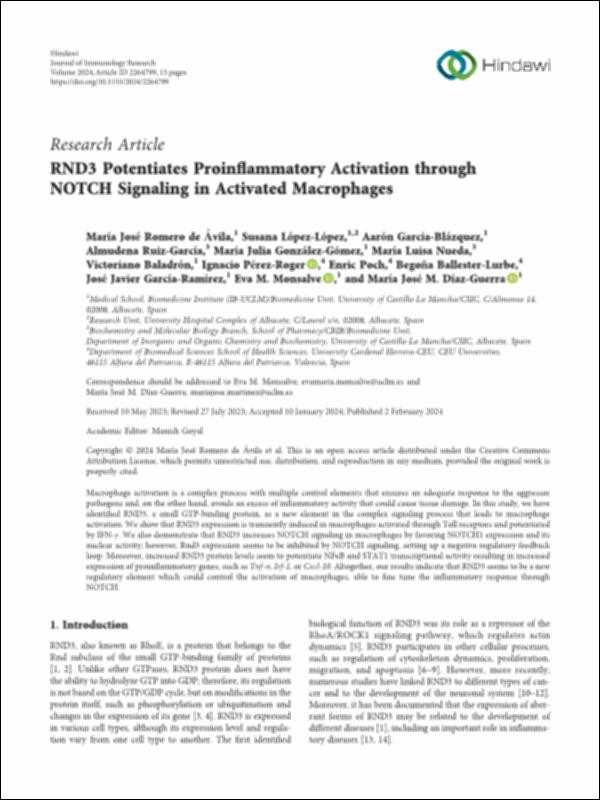Please use this identifier to cite or link to this item:
http://hdl.handle.net/10637/15506RND3 potentiates proinflammatory activation through NOTCH signaling in activated macrophages
| Title: | RND3 potentiates proinflammatory activation through NOTCH signaling in activated macrophages |
| Authors : | Romero de Ávila, María José López López, Susana García Blázquez, Aarón Ruiz García, Almudena González Gómez, María Julia Nueda, María Luisa Baladrón, Victoriano Pérez Roger, Ignacio Poch Jiménez, Enric Ballester Lurbe, Begoña García Ramírez, José Javier Monsalve, Eva M. Díaz Guerra, María José M. |
| Keywords: | Macrófagos; Macrophages; Sistema inmune; Immune system; Inmunología; Immunology; Proteína; Proteins; Inflamación; Inflammation; Célula; Cells |
| Publisher: | Hindawi |
| Citation: | De Ávila, M.J.R., López-López, S., García-Blázquez, A., Ruiz-García, A., González-Gómez, M.J., Nueda, M.L., Baladrón, V., Pérez-Roger, I., Poch, E., Ballester-Lurbe, B., García-Ramírez, J.J., Monsalve, E.M. & Díaz-Guerra, M.J.M. (2024). RND3 potentiates proinflammatory activation through NOTCH signaling in activated macrophages. Journal of Immunology Research, vol. 2024, art. 2264799. DOI: https://doi.org/10.1155/2024/2264799 |
| Abstract: | Macrophage activation is a complex process with multiple control elements that ensures an adequate response to the aggressor pathogens and, on the other hand, avoids an excess of inflammatory activity that could cause tissue damage. In this study, we have identified RND3, a small GTP-binding protein, as a new element in the complex signaling process that leads to macrophage activation. We show that RND3 expression is transiently induced in macrophages activated through Toll receptors and potentiated by IFN-γ. We also demonstrate that RND3 increases NOTCH signaling in macrophages by favoring NOTCH1 expression and its nuclear activity; however, Rnd3 expression seems to be inhibited by NOTCH signaling, setting up a negative regulatory feedback loop. Moreover, increased RND3 protein levels seem to potentiate NFκB and STAT1 transcriptional activity resulting in increased expression of proinflammatory genes, such as Tnf-α, Irf-1, or Cxcl-10. Altogether, our results indicate that RND3 seems to be a new regulatory element which could control the activation of macrophages, able to fine tune the inflammatory response through NOTCH. |
| URI: | http://hdl.handle.net/10637/15506 |
| Rights : | http://creativecommons.org/licenses/by/4.0/deed.es Open Access |
| ISSN: | 2314-8861 2314-7156 (Electrónico) |
| Issue Date: | 2-Feb-2024 |
| Center : | Universidad Cardenal Herrera-CEU |
| Appears in Collections: | Dpto. Ciencias Biomédicas |
Items in DSpace are protected by copyright, with all rights reserved, unless otherwise indicated.


